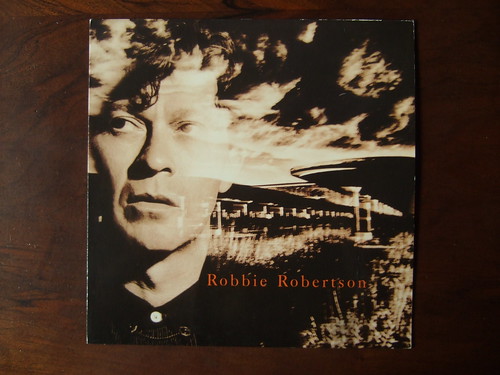R.I.P. Robbie Robertson, rock legend and frequent Scorsese collaborator
Robbie Robertson #RobbieRobertson

Robbie Robertson has died. A Canadian rock legend best known for his work with Bob Dylan and The Band, Robertson also had a long and prolific career as a film composer and music supervisor, most notably working with Martin Scorsese on a number of the director’s films. (The two met when Robertson recruited Scorsese—then still fresh off of Taxi Driver—to document The Band’s final concert in 1976, producing foundational rock documentary The Last Waltz.) An occasional actor—most notably in 1980’s Carny, which he produced from his own experiences working as a young carnival worker in his teens—Robertson was a vibrant force across the arts. Per Variety, he died this week after a long illness. Robertson was 80.
That time Riley Keough almost poisoned Andrew Garfield
Scorsese—who collaborated with Robertson on many of his films, including this summer’s Killers Of The Flower Moon, which Robertson composed—issued a statement about his long-time friend’s death today, writing, “Robbie Robertson was one of my closest friends, a constant in my life and my work. I could always go to him as a confidante. A collaborator. An advisor. I tried to be the same for him. Long before we ever met, his music played a central role in my life — me and millions and millions of other people all over this world. The Band’s music, and Robbie’s own later solo music, seemed to come from the deepest place at the heart of this continent, its traditions and tragedies and joys. It goes without saying that he was a giant, that his effect on the art form was profound and lasting. There’s never enough time with anyone you love. And I loved Robbie.”
The Weight (Remastered 2000)
Born in Canada in the 1940s to factory worker parents, Robertson gravitated to the arts early; he joined his first band when he was still a minor, before catching the attention of rockabilly icon Ronnie Hawkins, who added him to the touring line-up of his backing band, The Hawks, when Robertson was still just in his teens. Although the membership would change from time to time, the Hawks stuck together in one form or another for the next 20 years, eventually evolving into frequent collaborators with Bob Dylan and—in their own right—gaining international prominence under their new name: The Band.
Starting for Hawkins on bass, Robertson spent the next decades developing his skills as both a guitarist and a songwriter, eventually contributing some of the greatest hits to The Band’s discography, helping to create the blend of rock, folk, gospel, blues, and more known as Americana in the process. (It’s not for nothing that the Hawks were right there touring alongside Dylan during his infamous electric period, serving as his backing band for the sometimes revolt-inducing rock sets of his 1965 tour.)
The Night They Drove Old Dixie Down (Remastered 2000)
The Band rose to prominence (with their new name) in the late ’60s and early ’70s, building on their work with Dylan. Robertson songs like “The Weight,” off the group’s debut album Music From Big Pink charted the themes and styles The Band would follow for the next decade, which they’d continue to pursue with 1969’s The Band, 1970’s Stage Fright, and beyond.
By the mid-’70s, though—and with Band members being pulled in multiple directions by their various artistic pursuits—Robertson pitched his bandmates on bringing the project to a close with a bang. The eventual result was The Last Waltz, a lavish, star-studded farewell concert that included a full Thanskgiving dinner(!) for attendees, plus appearances from Hawkins, Dylan, Eric Clapton, Muddy Waters, and many other major musical names. Scorsese filmed it all, with extensive planning help from Robertson; The Last Waltz arrived in theaters in 1978, to critical acclaim. (Its soundtrack album was also a major hit on the audio charts, natch.)
Robertson focused on the film world for most of the next decade, filming on Carny, and working periodically with Scorsese. Although he sometimes worked as a composer, Robertson was just as likely to work on one of the director’s film’s as a music supervisor, sourcing the perfect track to accompany a scene, work that became a passion project for him. The pair first worked together in this capacity on 1980’s Raging Bull; Robertson would ultimately contribute work to every subsequent decade of Scorsese’s career, including The King Of Comedy, Casino, Shutter Island, Silence, and more.
I Hear You Paint Houses
In addition to his film work, Robertson continued to produce music as a solo artist and producer for the rest of his life, releasing multiple albums under his own name. (His final album, 2019’s Sinematic, included songs Robertson contributed to Scorsese’s The Irishman, including the Van Morrison-featuring “I Hear You Paint Houses.”)
Robertson’s manager issued a statement today, writing, “Robbie was surrounded by his family at the time of his death, including his wife, Janet, his ex-wife, Dominique, her partner Nicholas, and his children Alexandra, Sebastian, Delphine, and Delphine’s partner Kenny. He is also survived by his grandchildren Angelica, Donovan, Dominic, Gabriel and Seraphina. Robertson recently completed his fourteenth film music project with frequent collaborator Martin Scorsese, Killers of the Flower Moon. In lieu of flowers, the family has asked that donations be made to the Six Nations of the Grand River to support a new Woodland Cultural Center.”